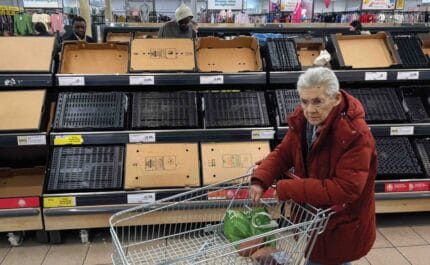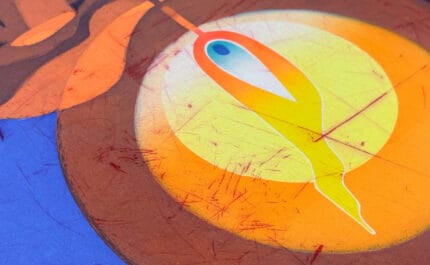Paradise lost
On 29th June 2016, the UK’s supreme court upheld a House of Lords ruling that the exiled people of the Chagos Islands could not return to their homeland – yet another setback in a decades-long legal battle. In DG#21, Matthew Lee reported on the Chagossians’ struggle in exile, their mass migration to West Sussex and their lengthy fight to return home
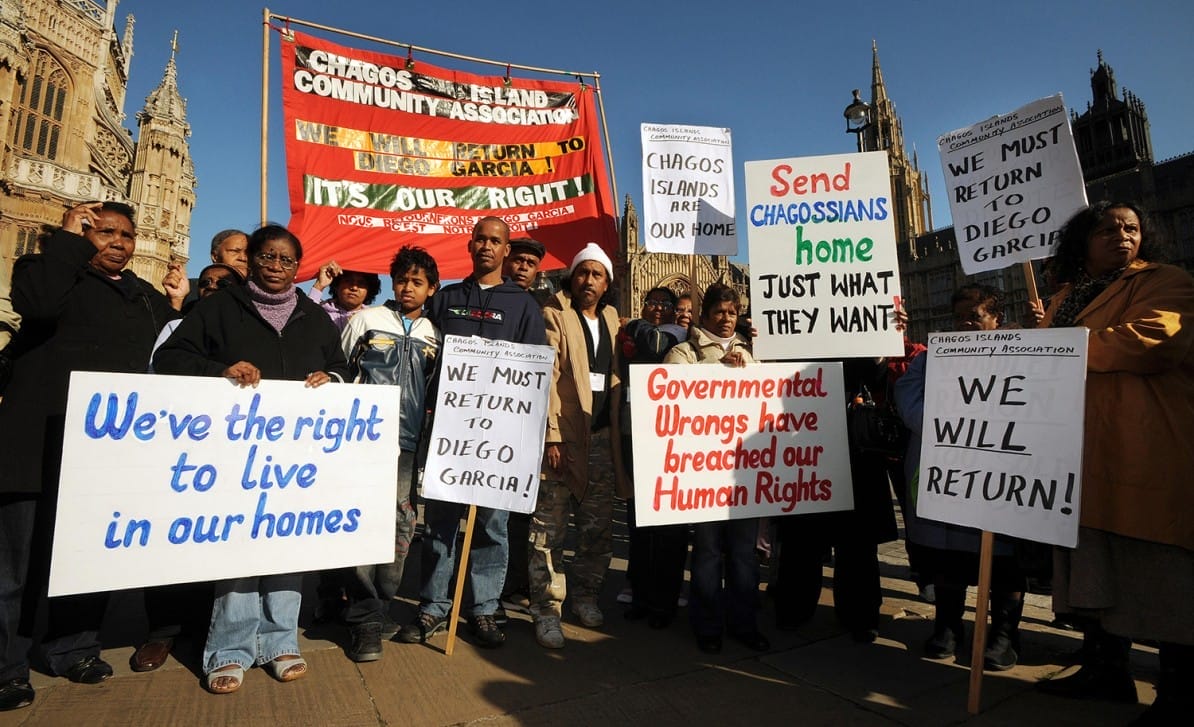
Supporters of the Chagos Islanders in Westminster following a 2008 judgment over the decision of the British government to stop the Chagos Islanders going home. Photo: Fiona Hanson/PA/PA Photos
28th October 2015 (Taken from: #21)
Bernadette Dugasse flicks through the photos on her computer and pauses at a shot of a derelict house, its crumbling exterior obscured by overgrown vegetation. “That’s where my mother worked before she was deported,” she says, shaking her head. “And the Americans say they are taking care of the buildings.”
Dugasse continues to scroll, lingers on a shot of a dazzlingly turquoise Indian Ocean, and sighs. An unspoiled beach, shadows of palms on the sand. She turns away from her desk in her south London living room. “It’s my mother’s birthday tomorrow,” she says. “She’s turning 81. She says I must keep fighting for return to the Chagos Islands so she can go and die on Diego Garcia. She wants to go home.”
Tarzans and Man Fridays
The world was a precarious place in early 1963, a few months after the Cuban missile crisis of October 1962 had edged it perilously close to all-out nuclear war. The American military sought a base in the Indian Ocean to counter increasing Soviet influence in the region, and it targeted Diego Garcia, the largest island of the British-owned Chagos archipelago, a scattered group of more than 60 islands 300 miles south of the Maldives.
The islands are even further from Mauritius, yet the British had grouped the two together in a quirk of colonial mapmaking and the Mauritians became de facto rulers of the Chagos Islands, which in effect became a colony of a colony. When Mauritius and Britain negotiated the former’s independence, a deal was made – the Chagos archipelago would remain British territory. This paved the way for a separate agreement, one with devastating implications.
Without any parliamentary or congressional oversight, a deal was made by the British and American governments for the UK to lease Diego Garcia to the US military for 50 years in exchange for a discount on the Polaris nuclear deterrent. There was just one problem. The US demanded a “swept” and “sanitised” island, but Diego Garcia had been home to a permanent population since the late eighteenth century. The United Nations would never condone its removal.
Whitehall officials quietly informed the British delegation at the United Nations that there was an issue regarding the native population, and that it was critical that all public references to these people should be avoided. In 1966 Foreign Office official Sir Paul Gore-Booth wrote to diplomat Denis Greenhill: “We must surely be very tough about this. The object of the exercise is to get some rocks which will remain ours… There will be no indigenous population except seagulls.” Greenhill replied: “Unfortunately along with the birds go some few Tarzans or Man Fridays whose origins are obscure.”
The entire population of the Chagos Islands – around 1,000 or 2,000 people depending on whether you ask the British government or those they displaced – was forcibly removed between 1967 and 1973.
Dumped at the docks
Bernadette Dugasse was expelled from Diego Garcia at the age of two, but not by the British. Her father had become embroiled in a dispute with the Mauritian plantation owners who ran the island, and was deported to the Seychelles along with his wife and children. Dugasse’s mother, who still lives in the Seychelles, had spent her entire life on Diego Garcia, as had her mother’s adoptive parents, who were eventually forced onto British boats and deported in 1972.
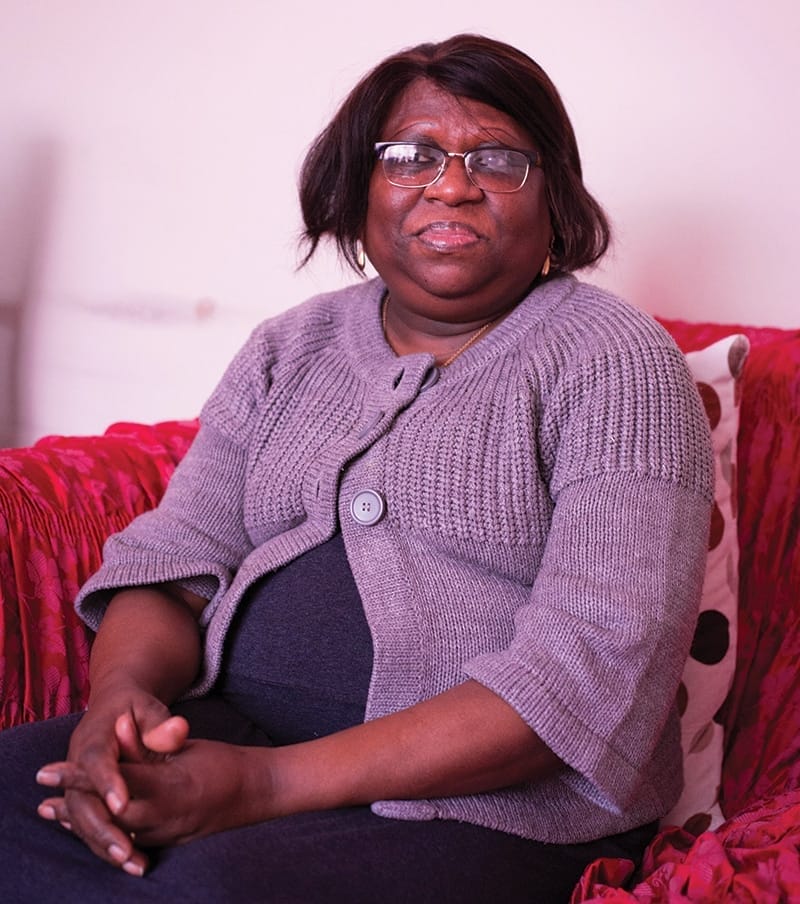
Bernadette Dugasse at her home in south London. Photo: Jess Orchard
Dugasse spent her childhood hearing happy stories about island life. “My mother always said that life on Diego Garcia was paradise,” she says. “It was like one big family. Food was plentiful. Everybody looked after each other’s children. Everybody was auntie, uncle, grandma, grandpa to all the children.” But when her mother’s parents arrived in the Seychelles following their deportation, they told a very different story. “My grandmother cried every day,” says Dugasse, who was a teenager at the time. “I asked her why she was unhappy. She told me about the deportations. She said the Americans would shout ‘fuck you’ at the Chagossian people. All the kids on the island had pet dogs and the British gassed all of them. They killed the dogs in front of the children and the parents. At first the Chagossian people refused to leave, but they thought if the British can do this to our dogs, they can do it to us too.”
The Chagos Islands’ first inhabitants arrived in the late eighteenth century, when coconut plantation owners shipped slaves and then, following the abolition of slavery in Mauritius, indentured workers from Africa and India. The inhabitants of the islands were far from autonomous by the 1960s – they were dependent on the owners of the plantations on the islands – but after nearly two centuries they had built their own houses, gardens and churches, and developed their own customs, culture and dialect, Chagossian Creole. Most adults worked as labourers on the coconut plantations, for which they earned a couple of dollars a month and received land, food rations and regular trips to Mauritius for healthcare and holidays. In 1968, holidaying Chagossians lining up for the steamship journey back to Diego Garcia received a nasty surprise. They were told that their island had been sold. There would be no journey home.
The Americans began building their base in March 1971, a month before the British made it a criminal offence for anybody other than authorised military personnel to set foot on the islands. There was no more work, the shops had closed, the dogs were dead, and British cargo ships were arriving to deport the desperate islanders, around one hundred at a time. Diego Garcia was emptied first; the other inhabited islands, Peros Banhos and Salomon, were dealt with afterwards.
The Chagossians were dumped at the docks of Mauritius and the Seychelles. Many families were separated. They were forced to find whatever accommodation they could. They faced widespread discrimination – their dialects, ID cards and often their skin colour marked them as ilois (‘islanders’ in Creole) – and their lack of formal education made it hard to get jobs. Many succumbed to alcoholism and drug abuse. A New York Times journalist visiting the Mauritian capital of Port Louis in 1981 wrote that walls in the city slums were “daubed with anti-British slogans” and that “many ilois had taken to begging and picking pockets”. A local politician quoted in the story called the Chagossians “the Palestinians of the Indian Ocean.”
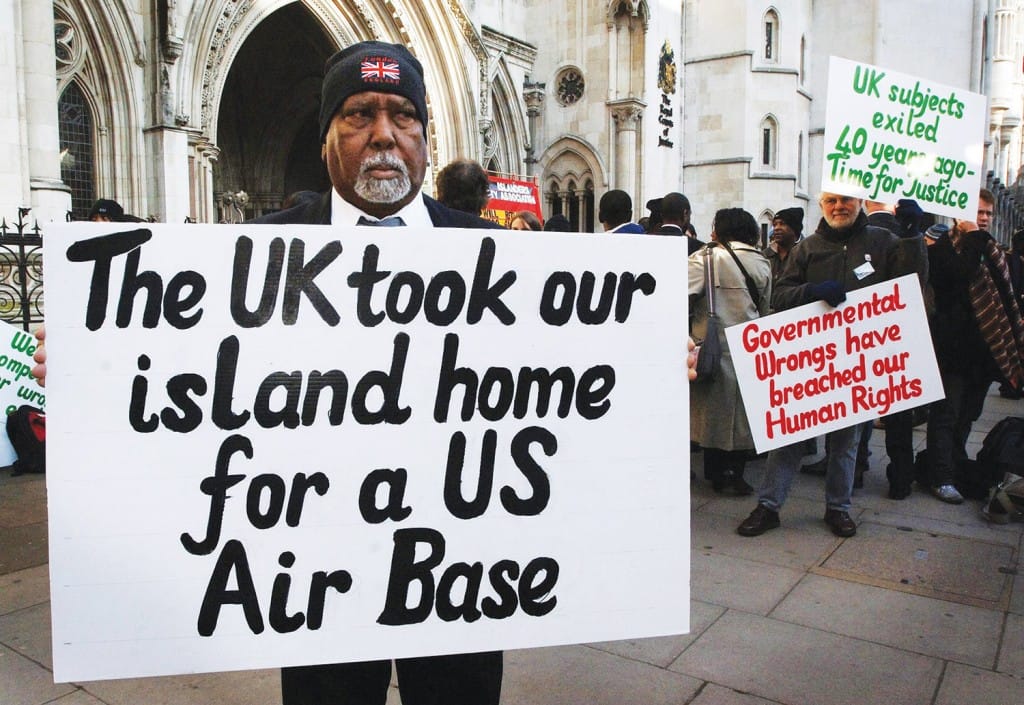
A Chagossian campaigner outside the high court in London, 2007. Photo: Fiona Hanson/PA Archive/Press Association Images
From poverty and discrimination grew anger. Chagossians in Mauritius and the Seychelles started fighting back. There were hunger strikes and violent clashes with police, and eventually Chagossian representatives were allowed to meet British and Mauritian officials to discuss compensation. In 1982, after a lengthy legal battle, Margaret Thatcher’s government offered £4 million to be divided amongst the displaced islanders of Mauritius, but it wanted something in return. The Chagossians signed forms, written in a language most of them didn’t understand, waiving the right of return to their native islands.
There’s a word in Creole that Chagossians use to describe their experience of exile. Sagren. It refers to the shock of displacement, the lack of hope, and a profound sadness. As the world slowly became aware of their plight, the Chagossians in Mauritius and the Seychelles were emboldened to demand something greater than mere financial compensation. They wanted to go home.
Sagren prolonged
On 3rd November 2000, the British high court ruled that the Chagossian people had the right to return to the Chagos Islands.
Dugasse, who had been flying between the Seychelles and London to attend court, was delighted. She had become politically active as a young woman, unable to understand why her family couldn’t return to its homeland. She worked with Olivier Bancoult, founder of the Chagos Refugee Group in Mauritius, and as a resident of the Seychelles she offered the group a potential legal edge – her own community, significantly smaller than the one in Mauritius, had never received compensation, or waived its right of return.
“We were so happy when we won at the high court.” She laughs. “We won, we lost, we won again, we lost again.”
Shortly after the ruling, the British government declared that Diego Garcia, where the majority of islanders had once lived, would remain off-limits for as long as it was still home to a US military base. There were many more blows to come. Fifteen more years of battling for justice through the British system would leave many Chagossians confused, exhausted and totally depleted of hope.
All the kids on the island had pet dogs and the British gassed all of them. They killed them in front of the children and the parents” – Bernadette Dugasse
Here’s the nutshell version of a protracted, expensive and fiendishly complex legal battle. The high court ruling of 2000 overturning the 1971 law banning non-military personnel from the islands was itself overturned in 2004 when the British government used an obscure royal prerogative to bypass parliament. In 2007, judges at the UK court of appeal described Britain’s policies in the 1960s as “repugnant” and reinforced the islanders’ right to settle on any island in the Chagos archipelago apart from Diego Garcia. The foreign office appealed against that judgement and in October 2008 the House of Lords ruled in its favour.
The Chagossians took their case to the European Court of Human Rights, which in 2012 declared that the islanders had “effectively renounced” their right to return when they accepted compensation in Mauritius in 1982. In June 2015, the Chagossians went to the UK’s supreme court to try and overturn the Lords’ decision, arguing that the government withheld an optimistic 2002 feasibility study from the Lords that could have swayed them towards a different verdict.
In 2010, Gordon Brown’s government established an enormous marine reserve around the islands which meant that fishing – a potential source of revenue for a resettled Chagossian population – was no longer permitted. Critics accused the government of ‘greenwashing’, using the excuse of the environment to make it even tougher for the islanders to return. The legality of the reserve was challenged by Mauritius, which has stepped up its efforts to claim sovereignty of the islands. The UK had previously pledged that it will transfer sovereignty of the islands to Mauritius when they are no longer needed for defence. The nature reserve was ruled lawful in the British high court, but in 2015, in a blow to Britain, a UN tribunal ruled against its legality. The Mauritian position on Chagossian return is unclear.
Part of the plan from the beginning was that if you build a base on British rather than US territory, the British government would have to take the heat”
The reason behind the British government’s stubborn opposition to Chagossian return is every bit as unclear. It’s hard to find a British official who isn’t at least publicly sympathetic to the islanders’ cause, which attracts cross-party support in the House of Commons. The Chagos Islands All-Party Parliamentary Group, established to seek the right of return, was previously headed by Jeremy Corbyn and as of 14th October 2015 is led by Conservative MP Andrew Rosindell. One obstacle to resettlement is the Mauritian sovereignty claim, another is the marine park and the concerns of conservationists. But a far larger one is surely the US military, although here we’re forced to speculate – the Americans almost never talk about Chagos and on the rare occasion they do the answer is always the same: it’s British sovereign territory. It’s not our problem.
“Part of the plan from the beginning was that if you build a base on British rather than US territory, the British government would have to take the heat,” says David Vine, author of Island of Shame, a 2011 book chronicling the expulsion of Chagossians for which Vine spent seven months with exiled islanders in Mauritius and the Seychelles before moving to Washington DC to interview former and current US officials about the creation of the base. “The British have to handle all the criticism and so it’s worked out swimmingly for the Americans.”
“It’s clear that the UK government has taken no steps of substance when it comes to Diego Garcia without consulting the US,” Vine continues. “Given the power relationship between the countries, I have to think that the US is effectively calling the shots. If Britain made a unilateral decision to allow the Chagossians to return I feel confident that the US would retaliate in some way.”
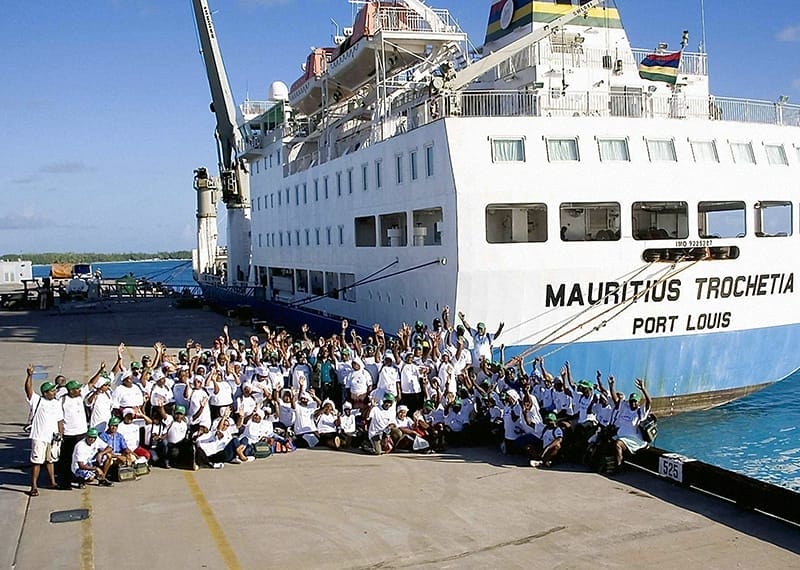
A group of Chagossians visit Diego Garcia in April 2006 on a trip organised jointly by the British and Mauritian governments. Photo: FCO / PA Archive/Press Association Images
Why would the US be so opposed to Chagossian return? “Indigenous populations could assert sovereignty, protest or cause trouble,” Vine replies. “Returned Chagossians might assert their right to self-determination.”
There exists at least one fragment of evidence of recent UK-US collusion, which emerged from the 2010 US embassy cables published by Wikileaks. According to US diplomats, in May 2009 Colin Roberts, the then foreign office director of overseas territories, told the Americans that Britain does “not regret the removal of the population”. He added that the establishment of a marine reserve “would, in effect, put paid to resettlement claims of the archipelago’s former residents.”
Both British and American flags adorn the walls of the Westminster office of Henry Smith. Indeed, the MP for Crawley and the vice-chair of the Chagos All-Party Parliamentary Group says he’s a “fan of the United States” and stresses that he’s pro-establishment (“I am a Conservative politician, you know”). Yet he too struggles to explain successive British governments’ entrenched opposition to Chagossian resettlement. “I do think it is odd that there has been this institutional intransigence by the British establishment against them [the Chagossians],” says Smith. “It is fundamentally going against the principles of liberal democracy. I do find it bizarre.”
Among British MPs, Henry Smith has a unique reason for taking an interest in Chagossian affairs. The largest Chagossian community in the world is in his constituency.
Little Chagos, Crawley
The bus from West Sussex pulls into the car park of the Central Ground, home of Sutton Coldfield football club, on 20th December 2015 and the young men of the Chagos Islands national team pour into a tatty changing room. It’s a blustery afternoon, and a queue forms at the refreshments counter, where pie and chips with a mug of Bovril will set you back £4.50. Today’s opposition in a friendly game is Panjab FA, a West Midlands team inspired by the nineteenth-century Sikh empire of Maharaja Ranjeet Singh. The Chagos Islands’ previous opponents include Sealand, who represent a “country” comprising a 6,000-square foot platform in the North Sea. Today’s teams hope to meet again later this year in Abkhazia, a disputed territory torn between Russia and Georgia, at the Conifa World Cup for nations that are unaffiliated with Fifa.
The Chagos national team was founded by Sabrina Jean, who runs an advice centre for the community in Crawley and represents Olivier Bancoult’s Chagos Refugee Group in the UK. “Chagos needs a football team,” she says, a scarf emblazoned with the words ‘Let Us Return’ wrapped around her waist. “It’s a good opportunity to raise awareness of our cause. We’re here to let people know what happened to our ancestors. This is why we play.”
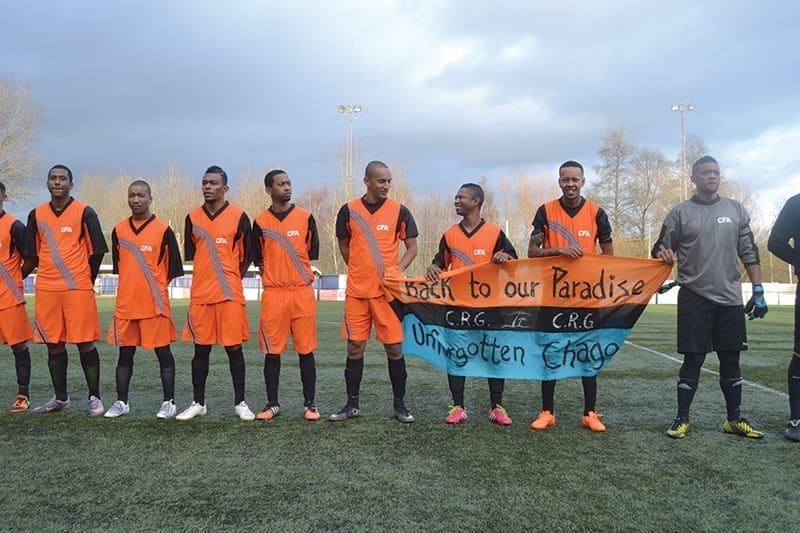
The Chagos Islands football team, comprised mostly of young men from Crawley, lines up to face Panjab FA in Sutton Coldfield. Photo: Matthew Lee
Unfortunately the young men from Crawley are outclassed. An impressive Panjab FA strolls to a 4-1 victory and a Chagossian defender is sent off for a dangerously mistimed tackle. The dozen or so Chagossian fans in the stands complain bitterly in Creole about the referee’s performance. The players, several of whom are still in their teens, eat burgers and chips in the clubhouse after the game, and then get back on the bus home.
Six weeks later, on 7th February 2016, Henry Smith MP joins the Chagos Islands football team for a fundraising event – they need £10,000 to fund the trip to Abkhazia and they’ve only raised the first £3,000. The MP pledges to continue to fight for Chagossian return in parliament. The team vows to win the cup for Crawley.
If flights to Heathrow from Mauritius in 2002 had been slightly cheaper, the team might have been representing Hayes or Slough in Abkhazia this summer. “I’d never even heard of Crawley,” says Allen Vincatassin, president of the provisional government of Diego Garcia and the Chagos Islands. “I was hoping to fly to Heathrow but Gatwick was cheaper.”
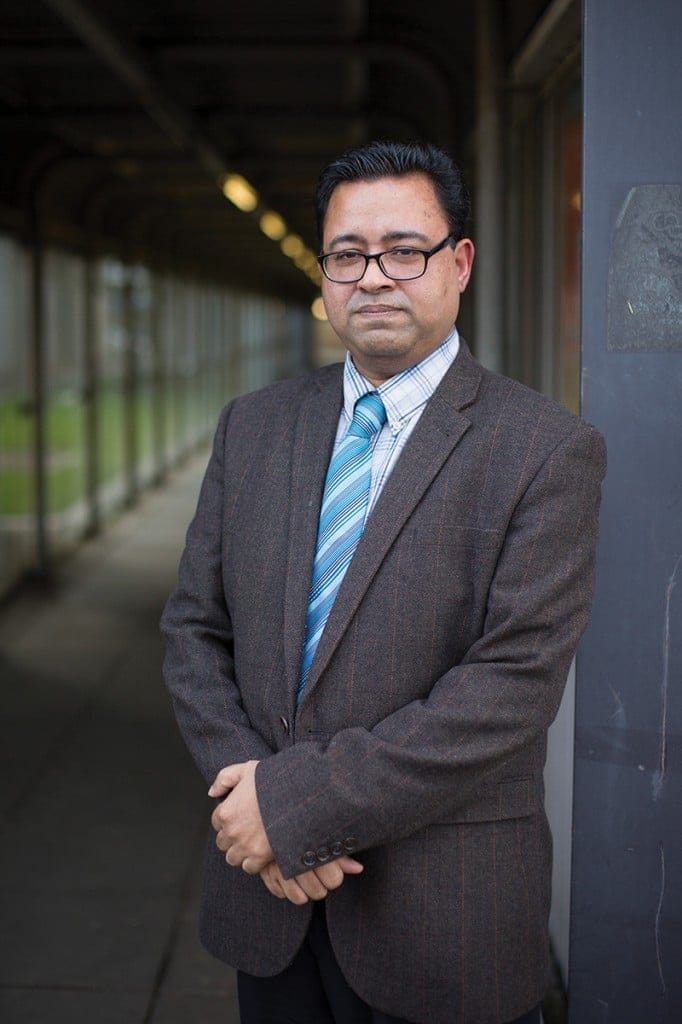
Allen Vincatassin at Gatwick airport. Photo: Jess Orchard
Vincatassin is smartly dressed in a suit and tie and has chosen a meeting place suited to an exiled head of state – the lobby of the Gatwick Hilton. There’s some symmetry here, as this was the first place Vincatassin slept after arriving from Mauritius with a group of Chagossians in September 2002. Well, not here exactly, but five minutes’ walk away, in the arrivals lounge. “We told the authorities we were coming but when we landed at Gatwick nobody was here to meet us,” says Vincatassin, while his PA Joelle – who is also his wife – scribbles notes about our discussion. The group of 16 spent three nights sleeping in the arrivals lounge before West Sussex County Council accommodated them in Crawley B&Bs while they looked for work and permanent places to stay. A second group of 50 people and a third of 120 people followed them from Mauritius to Crawley over the next couple of years.
It was the islanders’ second great migration. This one, however, was entirely voluntary. A Chagossian community numbering over 3,000 people is now based in Crawley. But it lives in limbo, five miles from an airport where many have found work, waiting for the moment when they can travel to Gatwick not to start a shift – but to fly to a new life in the Indian Ocean.
The British Overseas Territories Act was passed in May 2002, paving the way for Chagossians in Mauritius and the Seychelles to claim British citizenship, although another fight was required before the children of Chagossians born in exile were included. Vincatassin led that fight. He has a campaigning pedigree – in 1975 his grandfather Michel started the Chagossian struggle by suing the British government for forcing him from his ancestral homeland. Vincatassin mobilised islanders in Mauritius to move en masse to Britain so they could enjoy a better quality of life and push harder for an eventual return to the archipelago. “Before 2002 we were considered second-class citizens in Mauritius,” says Vincatassin, laughing. “But when we were given British passports suddenly everyone wanted to marry Chagossians.”
I have forgiven Britain for our exile. I had to let go, to forgive the policies of that time, and embrace Britain”
Only 122 votes were cast in the election which saw Vincatassin run unopposed for the presidency, an office he vows to dissolve if granted resettlement on Diego Garcia. He acknowledges that the Chagossian community is divided – not just geographically, between the UK, the Seychelles and Mauritius – but on key issues too.
The president is proud to be British. He says life in the UK is far better than in Mauritius. He was raised there by his grandparents after his parents were separated during the deportations – his mother was put on a boat to the Seychelles, while his father was sent to Port Louis. He didn’t see his mother again until he was 17. He wants to live on Diego Garcia, the island of his birth, under the British flag. Many agree with him – they don’t want to lose the British passports they fought so hard for – but some want Mauritian sovereignty. Others desire full autonomy.
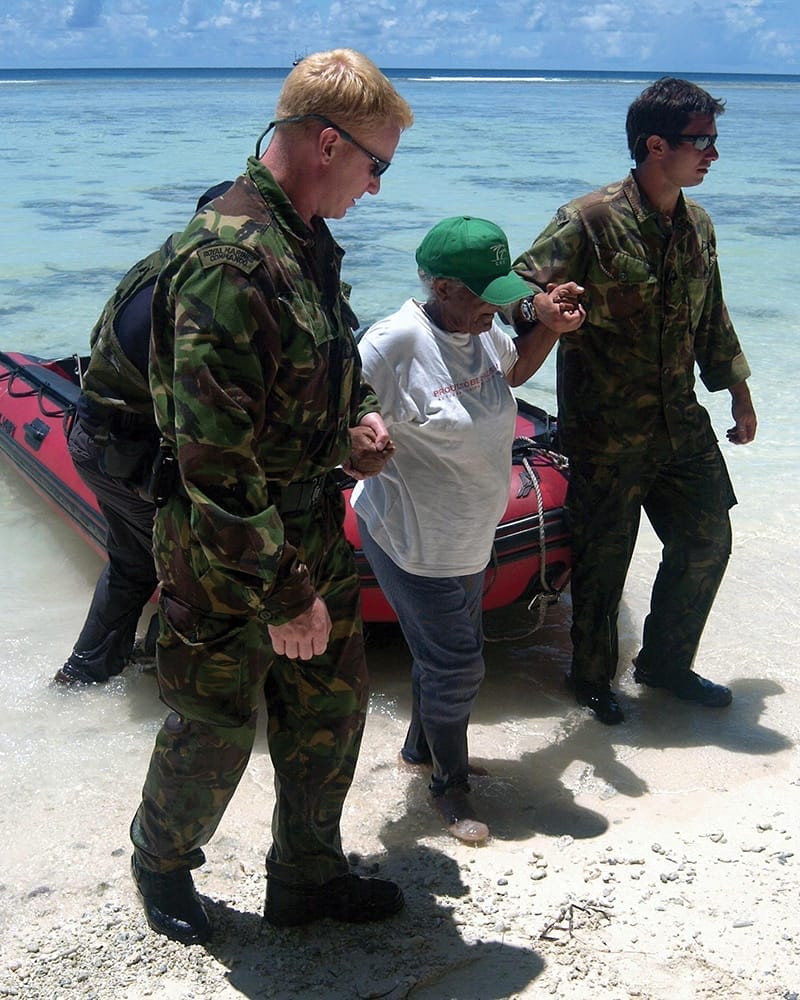
An organised visit to the island of Peros Banhos. Photo: Terry Boughton/FCO / PA Archive/Press Association Images
The community, understandably enough, doesn’t speak with a single voice. Not all Chagossians share Vincatassin’s enthusiasm for Britain; some say that life in the country comes with its own challenges. Some second and third generation Chagossians are uncertain about uprooting their lives to move to a remote island they’ve never been to. Some in the community identify primarily as Chagossian, others see themselves as British or Mauritian or Seychellois. Diego Garcia, Peros Banhos and Salomon are far apart – the Chagossians from different islands never mixed before their expulsion from the archipelago – and some cultural differences linger.
There is no clear agreement on how the community should pursue the right to return. While the Chagos Refugee Group continues to fight the British government through the courts, Vincatassin has taken a different approach. “The provisional government was created to work with the UK government for a successful resettlement,” he explains.
How can he justify his faith in the United Kingdom and its values, after everything the country has put his people through?
“I have forgiven Britain for our exile,” he replies. “If I draw my energy from the past, what they’ve done against us, I wouldn’t be able to make progress. I had to let go, to forgive the policies of that time, and embrace Britain and what it stands for. That’s how I’ve been able to meet ministers and say ‘look, we’ve been exiled for over 40 years. It’s enough now. We want to return home.’ Nothing will be gained by fighting, but diplomacy will get us a breakthrough.”
2016 – the year of return?
President Vincatassin is convinced the time has come. Very soon, perhaps this year, he’ll be living on Diego Garcia, he says. He points to a feasibility report commissioned by the British government and conducted by the consultancy company KPMG which concluded that resettlement was economically viable. The UK government responded by saying that the estimated (and hotly disputed) £64 million cost of resettlement, an amount Henry Smith says is “a drop in the Indian Ocean”, was too much considering the “fundamental uncertainty” of Chagossian interest in a return. The government commissioned another study. On 24th January 2016 the results were published: 98 percent of the 844 Chagossians polled (in various countries) were in favour of resettlement. Seventy percent said they would be prepared to take a job with the UK government or US military, the only employers on the island.
It’s perhaps surprising that only a third of Chagossians bristled at the thought of working for the governments that displaced them, especially if they had kept an eye on news from Diego Garcia. Several US officials, including Lawrence Wilkerson, who was chief of staff to Colin Powell at the US state department, have alleged that the CIA tortured detainees on the island as part of its extraordinary rendition programme, prompted by the War on Terror.
Stefan Donnelly of the UK Chagos Support Association says the KPMG feasibility study and follow-up survey prove that a managed resettlement is the right option. “We expect the government to announce a policy and we hope it’s a return programme that can start as soon as possible,” he says. “We think it will happen soon but we’ve been wrong before. There have been many delays and the community is very cynical.”
A supreme court decision regarding the 2008 House of Lords verdict is expected soon and could also boost Chagossians’ chances of return. 2016 also sees the US military’s 50-year lease expire, although few doubt that a 20-year extension will be approved, especially since British sovereignty over the islands will come into question if it’s determined that a US base is no longer needed. Campaigners have long hoped that the UK would make Chagossian return a condition of renewal. Henry Smith says he’s been trying – and failing – to get an answer from the foreign office on the status of renewal negotiations, but he too is optimistic, insisting that Chagossians are “closer now than they have ever been” to a return.
In the years since Chagossians began fighting for the right to return, hundreds of native-born islanders have died, their sagren never conquered”
A government policy of Chagossian return is unlikely to mean the end of this story. If the right to return is only offered to skilled, working-age people, which is one possibility, what will happen to the elderly native-born Chagossians, who dream of seeing the islands again before they die? And what about the thousands of Filipino workers on the US base, some of whom have spent many years on Diego Garcia and now call it home? Would they have to leave to make way?
In her south London living room, Bernadette Dugasse continues to flick through the photos she took in 2011, when the British government funded a trip to the islands for a small group of Chagossians. She looks at photos she took of ghost villages – abandoned churches and neglected cemeteries – as well as brightly-lit canteens where American and Filipino flags hang from the wall. It was the first time most members of the group had set foot on Chagos soil since they were children.
“Since the trip I daydream about living on Diego Garcia all the time,” says Dugasse, who, as a resident of the Seychelles, relocated to the UK separately from the exodus to Crawley. “The islands are so beautiful. There was a woman in our group who was raised there and she fell silent for the entire trip. She just couldn’t talk.”
Will her daydreams soon become a reality? Will her elderly mother be allowed to live out her remaining years on Diego Garcia? In the years since Chagossians began fighting for the right to return, hundreds of native-born islanders have died, their sagren never conquered.
“I used to have hope but not any more,” says Dugasse. “We’ve been disappointed too many times.”
Slow Journalism in your inbox, plus infographics, offers and more: sign up for the free DG newsletter. Sign me up
Thanks for signing up.
